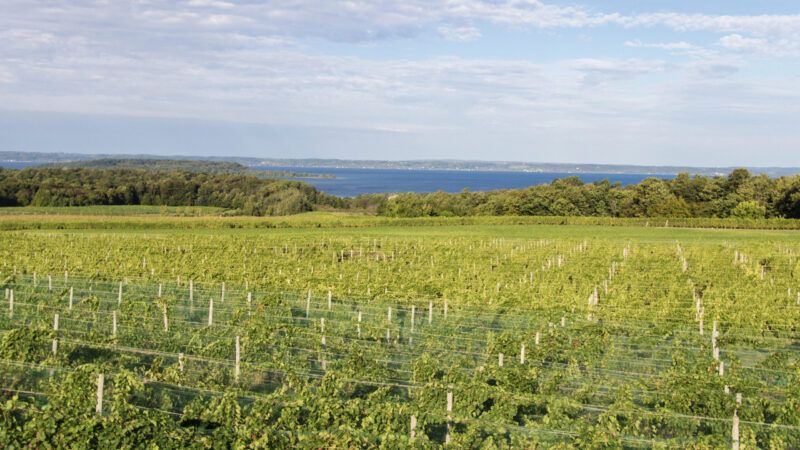Michigan Wineries Win $50 Million in Fight Against Local Zoning Rules
A federal judge ruled that Peninsula Township’s former restrictions on music, events, and grape sourcing violated the rights of local wineries.

Amid the bucolic vineyards and winding hills of Old Mission Peninsula in northern Michigan, a group of wineries has fought a brutal multiyear legal battle against a restrictive zoning ordinance enacted by the local township. This month, a federal judge definitively sided with the wineries, but the township officials show no signs of admitting fault.
Peninsula Township enacted a zoning ordinance in 1972, with the purpose of maintaining the rural and viticultural nature of the Old Mission Peninsula. Among other restrictions, the ordinance limited the types of events that wineries could host on-site, limited the volume of amplified music played by wineries, and mandated that all wine produced be made with at least 85 percent grapes from the peninsula itself.
As the craft beverage boom gained momentum in recent decades, wineries on the Old Mission Peninsula inevitably ran up against these limitations as they sought to expand their businesses. But Peninsula Township officials remained steadfast in their efforts to enforce the rules.
Shocking stories were told during the trial. Edward O'Keefe Jr., chairman and CEO of Chateau Grand Traverse—the first winery on the Old Mission Peninsula—recalled hosting an on-site fundraiser to benefit a local elementary school teacher with cancer. O'Keefe claimed that the township clerk called on the day of the event, notifying him that the township was aware of the event and that the winery did not have a permit. After informing the clerk that the event would include fewer than 75 people and therefore did not require a permit, O'Keefe said the clerk replied, "Well, we'll see about that," and warned, "If it exceeds 75 people, we will know about it."
The township's special-use permits often left more ambiguity than clarity. Some allowed "outdoor functions such as wine tasting parties, festivals, etc." but left unclear whether indoor events were permitted. Another provision in a winery's permit allowed for "low-level mood music" without any indication of what that meant. Other restrictions, such as the 85 percent grape mandate, proved similarly burdensome, as wineries claimed that there were not enough grapes in the entire peninsula to allow them all to fulfill this quota.
In 2020, a group of 11 wineries filed suit in federal court against Peninsula Township's ordinance. In addition to the township's defense of the ordinance, a local group called Protect the Peninsula eventually intervened to defend the ordinance as well, triggering a land use fight that pitted small businesses against NIMBYs ("not in my backyard").
In a series of decisions handed down over the past few years, Judge Paul Maloney of the Western District of Michigan struck down the 85 percent fruit mandate and permitted wineries to play amplified music. The township finally saw the writing on the wall and repealed or revised many of the problematic parts of the ordinance in 2022.
This month, Maloney issued an exhaustive 75-page opinion and awarded $50 million in damages to the plaintiffs for the rights violations they experienced before the ordinance was repealed. The township is refusing to pay and plans to appeal the decision.
The Michigan case echoes a similar conflict in Napa County, California, which suffers under its own outdated and onerous ordinance. In fact, the same law firm that represents the Old Mission wineries in Michigan is behind a federal lawsuit against Napa County's restrictions.
